Despite nearly becoming extinct around the time of World War I, the Leonberger has a modest but devoted following. The breed was recognized by the American Kennel Club in 1991. If you are thinking of getting a Leonberger pup yourself, you will need to know what to expect in terms of development. Here we chart the expected growth of a Leonberger and list common milestones and tips for new owners.
Breed Summary
Gorgeous Leonbergers have huge bodies and equally huge hearts. Originally bred in Germany, these are the gentle giants of the dog world. Despite their dramatic appearance, they are patient, serene, and surprisingly elegant dogs. When fully grown, the males can weigh as much as their human companions, and their magnificent coat requires constant attention.
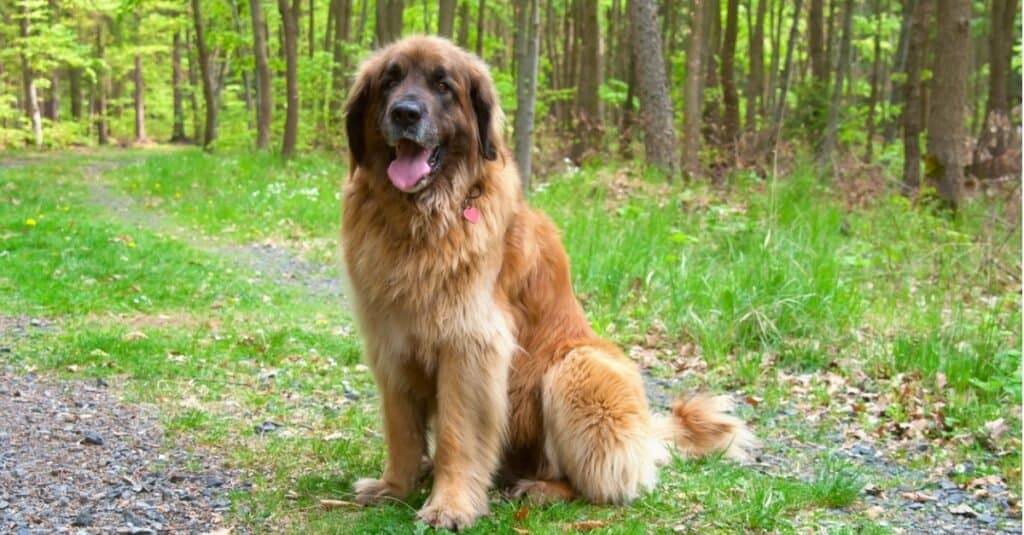
Leonbergers are bred as companion dogs and enjoy being in the company of their owners.
©Kaca Skokanova/Shutterstock.com
Leonberger Growth and Weight Chart by Age
Having a rough guide to your growing Leonberger pup’s growth and development can provide reassurance. However, it is important to understand that all pups are individuals and develop at different rates. Here are the average weights and milestones for Leonberger pups. On the whole, males are bigger and grow quicker than females.
| Age | Male Weight | Female Weight |
|---|---|---|
| Birth | 1 – 1.5 lbs | 0.5 – 1 lbs |
| 1 Month | 11-15 lbs | 4-8 lbs |
| 6 Weeks | 16-20 lbs | 9-11 lbs |
| 2 Months | 24-30 lbs | 12-19 lbs |
| 3 Months | 36-52 lbs | 31-42 lbs |
| 4 Months | 48-66 lbs | 42-52 lbs |
| 5 Months | 55-79 lbs | 51-64 lbs |
| 6 Months | 68-94 lbs | 59-77 lbs |
| 7 Months | 72-106 lbs | 66-88 lbs |
| 8 Months | 79-114 lbs | 72-94 lbs |
| 9 Months | 88-127 lbs | 75-99 lbs |
| 10 Months | 92-132 lbs | 79-108 lbs |
| 11 Months | 95-138 lbs | 81-114 lbs |
| 12 Months | 98-140 lbs | 84-117 lbs |
| 2 Years | 110 – 170 lbs | 90-140 lbs |
When Will My Leonberger Stop Growing?
Leonbergers reach their full size at about 18 months of age. Males may continue to grow a little after this but stop growing at about two years. Because this breed does not reach behavioral maturity until about three years, you basically have a huge puppy to contend with for a few months!
A healthy puppy weight can be achieved with a combination of the correct diet and appropriate exercise. Leonberger pups should have three meals a day until they are six months old and then two meals a day for the rest of their lives. The exact feeding quantities will be displayed on the food packaging (usually by pup weight). On average, a 25-pound, two-month-old pup requires half a cup of food three times a day. Whereas, a 140-pound, 12-month-old pup would require 2.5 cups of food twice a day. Puppies require constant access to fresh water so that they can drink as much as they want. Puppies who are not drinking need to be seen by a vet immediately as they can dehydrate quickly.
It is useful if you can learn how to judge if your Leonberger pup is gaining weight but there is no substitute for regular check-ups with your vet. They can assess if your pup is gaining weight appropriately. Pups should be seen by a vet every four weeks but more frequently if there are health concerns.
How Big Will My Leonberger Be When It’s Fully Grown?
Leonberger growth and eventually size are determined by a combination of genetics, environment (including diet), activity level, and whether they have been neutered or spayed. In general, males reach 110-170 pounds and females reach 90-140 pounds. Males reach a height of 28-31.5 inches and females reach 25.5-29.5 inches.
When Should My Leonberger Be Spayed or Neutered?
The best age to spay or neuter dogs can often be controversial, especially for larger breeds. Many Leonberger owners and breeders feel that it should not be done before the dog has reached two years of age. The argument for early spaying/neutering is that it prevents unwanted pups, although some also argue that there could be behavioral benefits. On the other hand, large and giant breeds do not mature until at least 18 months and spaying/neutering them early could introduce health risks. Therefore, it is important to speak to a vet with experience with the Leonberger breed who can advise you on the best timing for your particular dog.
When Should My Leonberger Be House Broken?
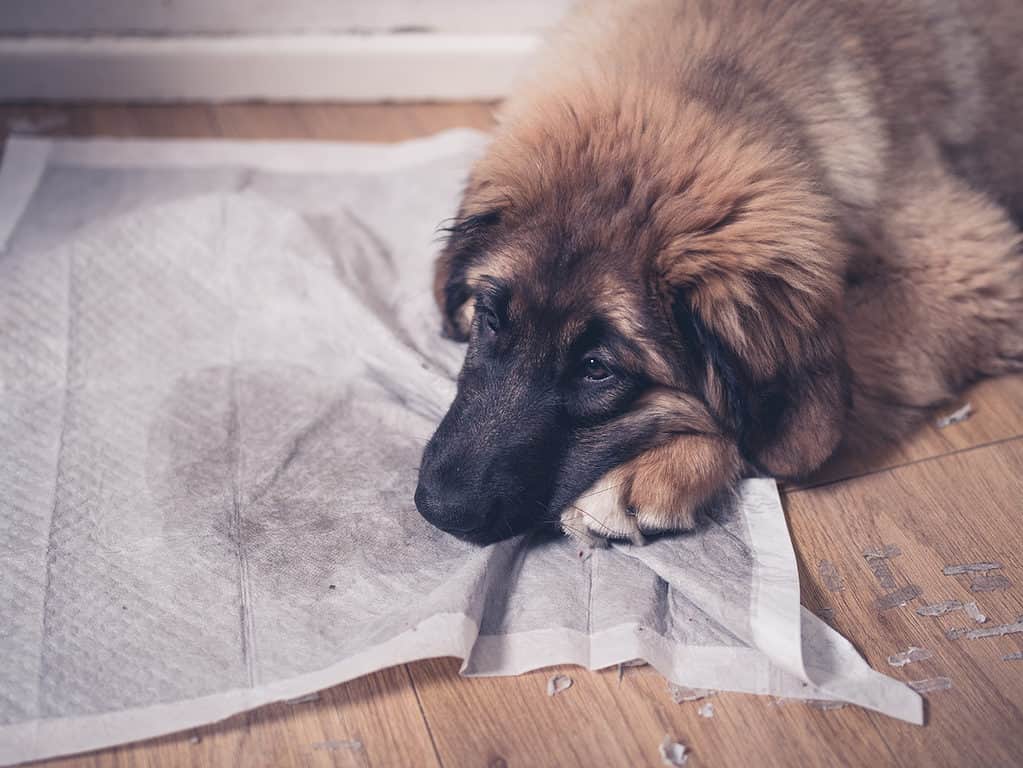
Never punish your Leonberger puppy for toileting accidents in the house.
©iStock.com/lolostock
On the whole, Leonberger pups are not hard to house-train. It can start at around four weeks when the pups will still be with their Mom at the breeder’s. From about seven weeks, they will be starting to go outside to potty. It is your job to build on this when you get them home. The only way to successfully house break a Leonberger pup is with consistency and patience. You will need to take the pup outside after every meal, play, and sleep. Keep a watchful eye and learn how to interpret their body language – you will soon spot when they need a poop or pee.
Accidents are an inevitable part of toilet training and should be ignored. Going potty in the right place (i.e. outside) however, should be praised and rewarded. Don’t forget that little pups cannot go through the night without going potty.
When Should My Leonberger Stop Eating Puppy Food?
Your breeder will provide you with enough food to keep your pup going for a while – sudden changes of diet can cause stomach upsets and should be avoided. If you are going to use a different brand, make the transition gradually and choose an appropriate food for a giant breed pup. Using inappropriate food can lead to rapid weight gain which will put too much strain on their joints.
The American Kennel Club advises that giant breeds such as Leonbergers can be transitioned from puppy food to adult food at between 18 and 24 months. Your vet or breeder can advise on the exact best time for your pup. You may also decide to transition from a puppy formula to a junior formula and then to an adult formula. There are several appropriate brands for giant breeds that you can choose from.
When Will My Leonberger Start Losing Teeth?
Pups will start to grow their adult teeth at around four months of age and this is when their baby teeth will fall out. Typically, Leonberger pups will ‘mouth’ a lot at this time so you need to direct this away from your own hands and feet and household objects. This breed can be enthusiastic chewers! Provide your pup with plenty of safe chew toys. Frozen carrots can provide great relief from the discomfort of teething. You may also notice that your pup is drooling more than normal at this stage.
When Should I Start Training My Leonberger?
The sooner you start training your Leonberger pup the better because no one wants a huge dog to be out of control! You can establish good practices and prevent your pup from getting into bad habits from just a few weeks of age. Things can be simple to begin with – you can move on to more complicated training once they are a little older.
Leonbergers are intelligent dogs who respond well to reward-based training and positive reinforcement. Harsh words and physical punishments should never be used. Training includes socialization – when your pup will learn how to behave correctly with other dogs, other animals, and humans (including children). Leonbergers form strong bonds with their humans – they do not make good kennel dogs. To prevent separation anxiety in the future, it may be a good idea to get your older pup accustomed to being left alone for short periods of time.
What Cues Should I Teach My Leonberger First?
Nearly everyone starts to train their pup with the sit command because it is the easiest one for them to grasp. Leonbergers are intelligent dogs and it should not take too long for your puppy to get the hang of it. Positive reinforcement is needed to help your little dog learn what you want them to do. Another common command cue to teach Leonbergers is ‘down’ followed by ‘stay’. It is also important to teach them to ‘heel’ early on – this is not a breed that you want pulling on the lead!
When Will My Leonberger Calm Down?
Leonberger pups are active and boisterous. This is often followed by an adolescent stage when dogs choose to ignore everything that you have taught them as a pup and think that they know best. Finally, you reach the adult/mature stage when most Leonbergers are serene and even-tempered. This stage will probably not be reached until after two years of age in this breed. In the meantime, you can help by offering your young dog plenty of physical and mental stimulation. They do not like to be left alone and the more time they can spend with you the better. Their separation anxiety can develop into unwanted behaviors. You also need to continue with calm and consistent training. Leonbergers can be wary of other dogs so socialization at this stage is vital.
Common Health Issues Your Leonberger Might Experience
There are a few health issues that are more common in giant-breed dogs and your Leoberger may be susceptible to these. Here are some of the more common ones:
- Gastric Dilation and Volvulus (severe bloat)
- Joint problems (hip dysplasia, arthritis)
- Cancer (osteosarcoma, hemangiosarcoma)
- Heart Disease (dilated cardiomyopathy)
- Cataracts
Pictures of Leoberger as Puppies
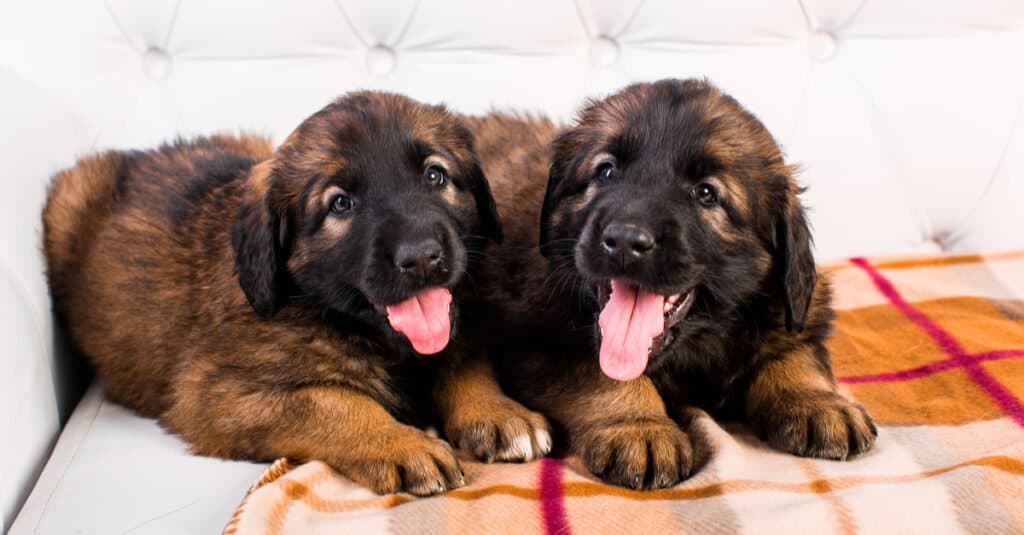
Leonbergers are very friendly and love children. However, they must be monitored when around children because of their size.
©Akbudak Rimma/Shutterstock.com
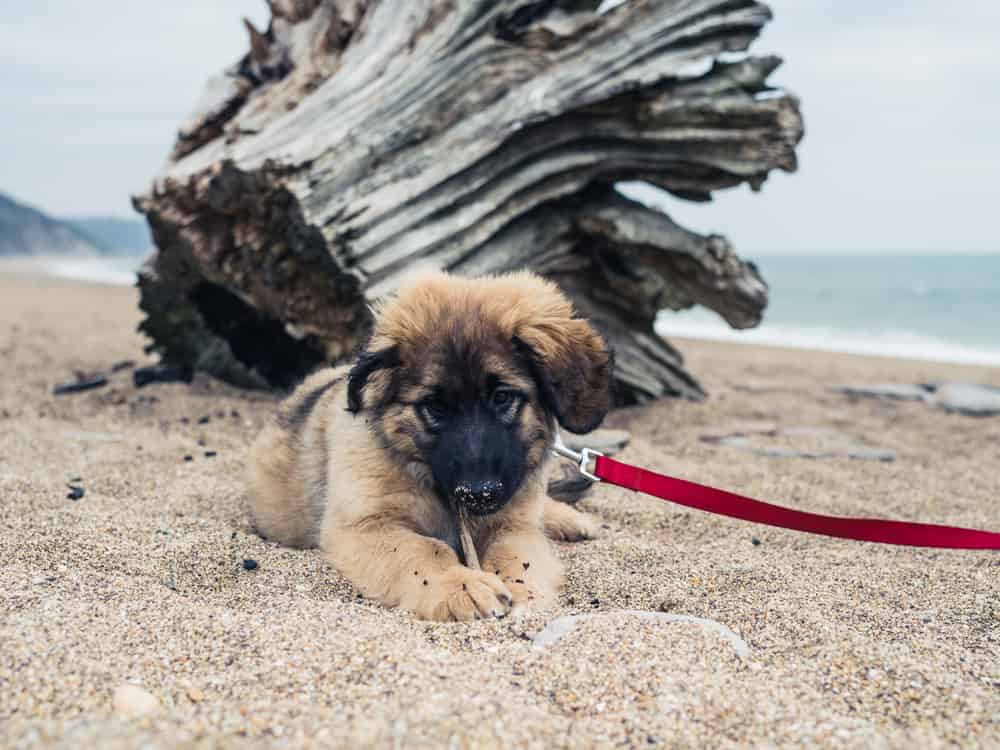
Leonberger pups grow fast!
©Lolostock/Shutterstock.com
Pictures of Leoberger at 6 Months
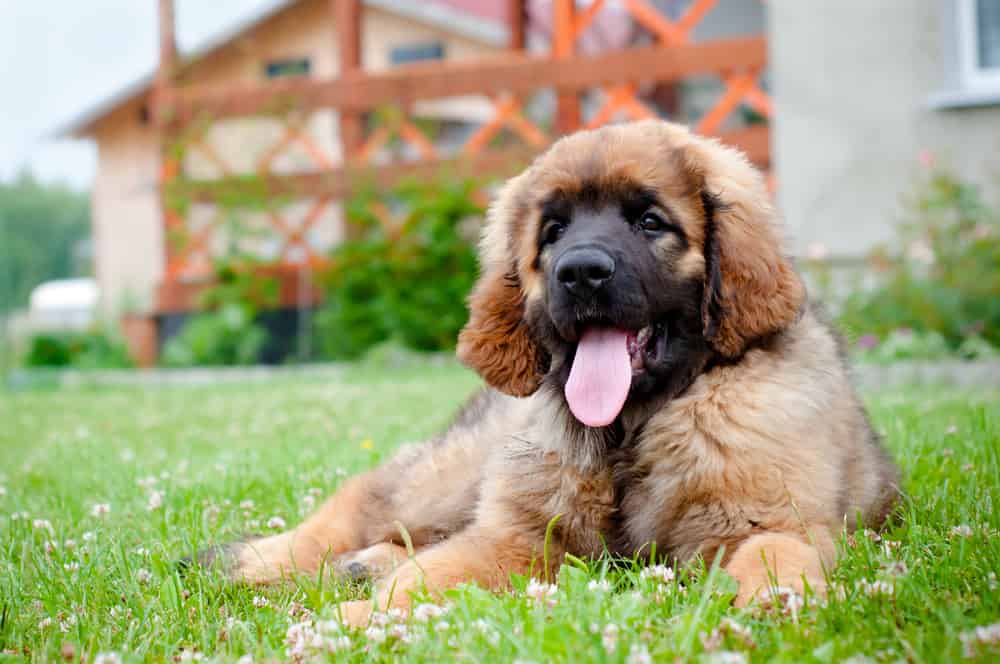
Pups are always cute – even big ones!
©otsphoto/Shutterstock.com
Pictures of Fully Grown Leoberger
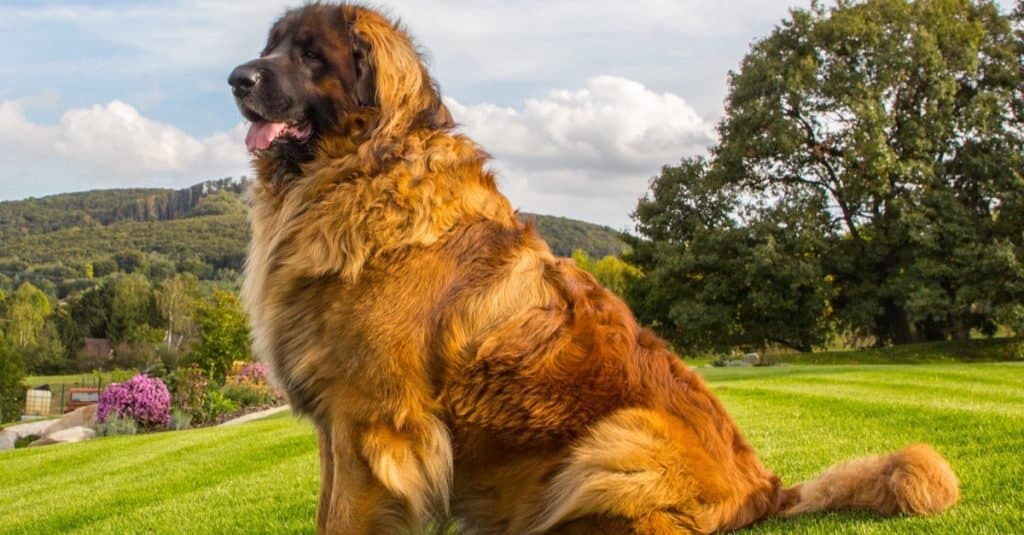
Leonbergers are strong and muscular, yet elegant dogs.
©Peter Josto/Shutterstock.com
The photo featured at the top of this post is © Wirestock/iStock via Getty Images
Ready to discover the top 10 cutest dog breeds in the entire world?
How about the fastest dogs, the largest dogs and those that are -- quite frankly -- just the kindest dogs on the planet? Each day, AZ Animals sends out lists just like this to our thousands of email subscribers. And the best part? It's FREE. Join today by entering your email below.
Thank you for reading! Have some feedback for us? Contact the AZ Animals editorial team.







